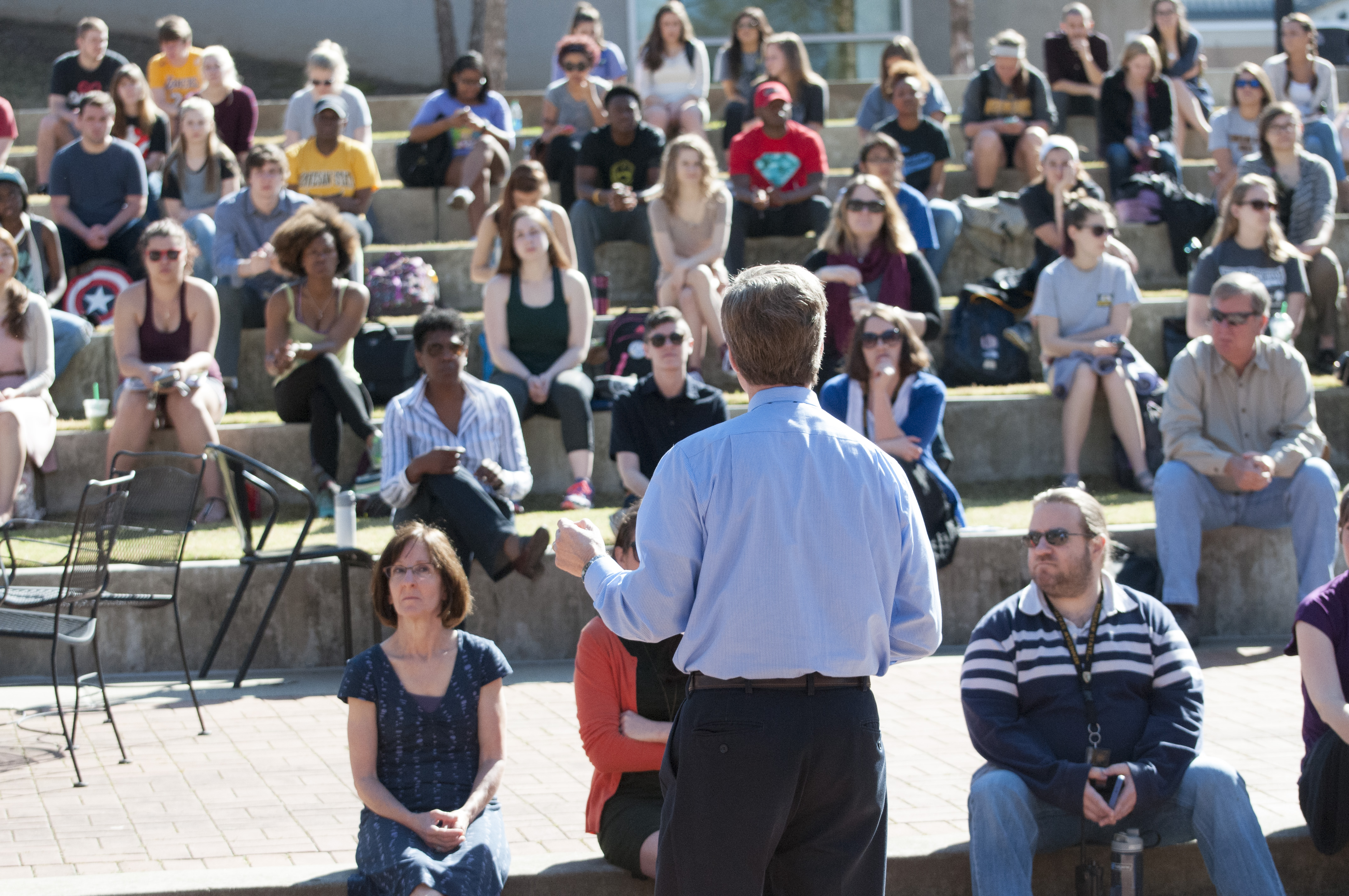The amphitheater outside Kennesaw State University’s Social Sciences building had a full house of students, faculty and staff in attendance for a teach-in about House Bill 859 Tuesday, March 15.
HB 859, also known as the campus carry bill, would allow anyone over the age of 21 with a weapons license to carry a gun anywhere on a public college or university campus statewide. Guns would be restricted in dorms, fraternity and sorority houses and sporting events. The bill has already passed both the state House of Representatives as well as the Senate and awaits the governor’s signature.
Several departments in the College of Humanities and Social Sciences organized the event, intended to be informational and unbiased. Scheduled speakers provided information on how legislation and lobbying work and gun policy. The floor was also left open for anyone to have a chance to speak.
Rosezeta Bobo, director of Alternative Dispute Resolution Services and Training, served as the moderator. Bobo held what looked like a real gun in her hand as she walked around before the event started, though attendees later learned that the gun was fake.
“I did not come here to shoot anybody,” Bobo, said. “However, this is what we’re talking about. We are here as a matter of issues that’s about to happen with this right here and how comfortable you feel or don’t feel with this process.”
Dr. Kerwin Swint, chair of political science, opened the teach-in and explained how the bill had to pass both houses before it was sent to the governor. Swint said that Georgia has always been a strong pro-gun state, but what’s changed is the question of “is having more guns making things safer?”
Swint also spoke on the viewpoint of government officials’ reason for pushing the bill.
“A gun-free zone makes it a soft target,” Swint said.
After Swint spoke, students immediately had their hands in the air ready with questions, concerns and opinions they wanted to voice. Many were shocked to learn that there is not a safety class or any training required to obtain a weapon permit.

Darina Lepadatu, associate professor of sociology, gave an international perspective on gun laws and crime in Romania. Lepadatu had never seen a gun until the teach-in. According to Lepadatu, Romania has the lowest rate of gun ownership and crime.
“You have to pass a training course, psychological exam, background check and it has to be renewed every three years,” Lepadatu said.
Tom Pynn, coordinator of the peace studies program, read a poem by poet Carl Sandburg.
“A gun can tell a terrible story with it,” Pynn said. “It is more rapid than any judge or court of law. When it has spoken, the case cannot be undone.”
Clipboards with a petition for attendees to sign were passed around along with a telephone number that students were encouraged to call and voice their opinions to the governor.
Chris Ziegler, professor of psychology, brought up how Texas recently passed their version of campus carry legislation and the constant debate they are also experiencing. Ziegler said that, in Texas, they now want teachers to teach the side that won’t make anyone mad.
“Gun laws will deprive you of education,” Ziegler said.
Robin Dorff, dean of College of Humanities and Social Sciences, expressed the complications that arise when guns are brought to the table.
“Permit to carry doesn’t give you the permit to intimidate,” Dorff said.
Dorff told the story of Paula Strange, a longtime KSU staff member who shot and killed her husband and then herself in 2014. Strange and her husband had gotten into an argument at a restaurant, which escalated and led to the two shootings. Many students at the teach-in voiced that, if a gun had not been present in that situation, there may have been a different outcome.
While the majority of attendees were strongly opposed to the bill, undeclared sophomore Brian Bowers remained firm in his belief.
“As an American citizen, it is my right to own one,” Bowers said.
Students opposed to the bill felt differently.
“If you’re taking this Second Amendment and you’re extending it, you’re inserting it into situations and creating more of an unsafe place,” Jonathan Dufner, a senior majoring in social and political philosophy, said.
Gov. Nathan Deal has until May 3, 2016 to veto the bill. If Deal decides to sign the bill, it would go into effect July 1, 2016.



Correct me if I am wrong, but I think brandishing a weapon in public is a misdemeanor. Wearing it in a holster or carrying it in your pocket is legal as long as you have a license. Why is a school any different than any other public place, like a shopping mall or a grocery store?
Brandishing is distinct from carrying. However, if the issue comes up in a open carry state, the courts must lean towards the carry, not the brandishing, as a matter of law. The reason is it is the expressed intent of the law to carry, and there is the 2nd amendment guaranteed right. Everything else is subjective interpretation and would be correctly dismissed. I’m a lawyer.